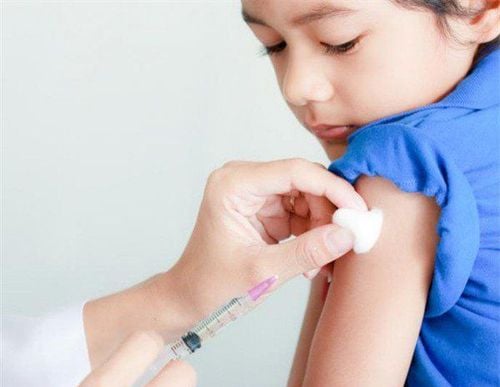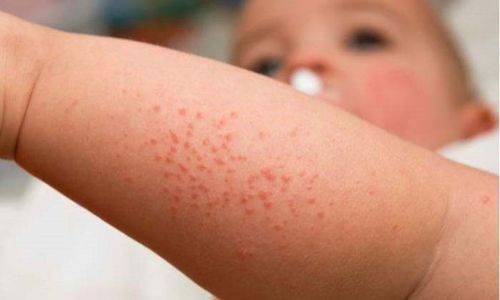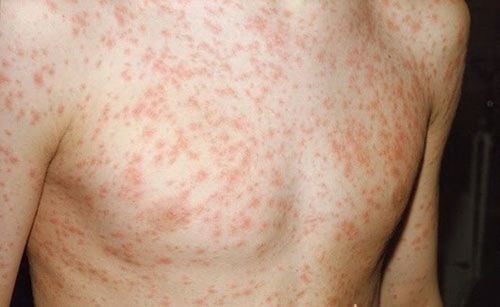This is an automatically translated article.
Rubella is a disease caused by a virus, a disease that spreads quickly, often breaking out in places with crowded and cramped environments. Rubella has early symptoms very similar to measles, but poses a danger to pregnant women. So how is Rubella different from common measles and what are the complications of severe disease?
1. Who is at risk for Rubella?
Rubella is an infectious disease caused by the Rubella virus, due to the characteristics of an infectious disease, Rubella is very contagious in the community. Anyone who has never had Rubella or has not been vaccinated against Rubella is at risk. The disease is common in infants under 12 months of age and is especially dangerous if it occurs in pregnant mothers.

Rubella có thể lây qua đường hô hấp qua những cơn ho, cơn hắt hơi.
2. How is Rubella different from common measles?
Basically the early symptoms of Rubella are usually milder than those of common measles, but the symptoms are quite similar, can include some of the following signs:
High fever usually from 38.5 degrees up to 39 degrees
Signs of inflammation of the upper respiratory tract such as: cough, sneezing, runny nose, eyes and nose with blurred ..., this symptom is usually mild even does not occur.
Rash
With common measles : The rash usually appears 2-3 days after fever, especially the rash appears from behind the ears and then to the face, finally spreading to the whole body and extremities. However, after the rash flies away, it will fly away in the corresponding order when it appeared and still leave bruises at the site where the rash appeared. With Rubella (German measles): The rash usually appears and goes away without any pattern, and when the rash goes away, it does not leave dark spots on the skin. Swollen lymph nodes: Usually only seen in Rubella disease, the most common location is: painful swollen lymph nodes behind the ears, behind the neck and behind the jaw... However, to be sure, we need the support of specialized tests. Modern and useful:
MAC-ELISA test detects measles-specific IgM antibody in serum. This is the most commonly used method for diagnosing the disease. Immunofluorescence technique for the detection of viral antigens in nasopharyngeal secretions or virus isolation in cell cultures from specimens such as nasopharyngeal secretions, ocular conjunctival membranes, blood, or urine of the patient prior to 3 days rash. These tests are rarely used in studies.
3. How dangerous is Rubella?
Rubella is usually not serious, but if it occurs in a pregnant woman, it will have extremely serious consequences for mother and baby.
In case the pregnant mother is infected with Rubella in the first 3 months or the last 3 months of pregnancy, it will be very dangerous for the baby, which can include a number of dangers such as: birth defects, stillbirth, stillbirth, rubella pregnancy...
Children born with congenital rubella are one of the risk factors for the formation of rubella epidemic in the community, greatly affecting the health of children in the community.
4. Preventing rubella properly
For children, the most effective way to prevent children is to vaccinate them, the vaccine can prevent 3 diseases at once, including: Rubella, measles, mumps. This vaccine is usually given to children 12-15 months of age and is repeated at 4-6 years of age. Vaccination not only helps children have good resistance to disease-causing factors, but also contributes to improving public health.

Tiêm vắc- xin đầy đủ giúp nâng cao sức khỏe cộng đồng.
In summary, people who do not have immunity against the disease need to be vaccinated with Rubella vaccine, especially for women of childbearing age or want to have children need to be vaccinated with the vaccine at least 1 month before becoming pregnant. . The immune product produced by the vaccine is very long, even several years later. At Vinmec, we always provide vaccines to prevent Rubella disease as well as infectious diseases of measles, mumps,... Customers will be carefully screened before injection, at the same time, monitor their health after injection, ensuring safety. complete and effective.
Vinmec International General Hospital is currently providing a Package Immunization Program with a variety of vaccines for different audiences, from infants, young children, adults, women before and during pregnant.
Particularly in December 2019, Vinmec will give you free newborn Hepatitis B Vaccine (immunization right after birth) for your baby when you sign up for a Package Immunization Package for children aged 0-1 or 0-2 year old .
Please dial HOTLINE for more information or register for an appointment HERE. Download MyVinmec app to make appointments faster and to manage your bookings easily.













